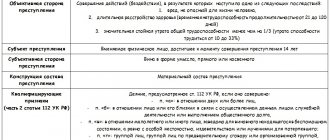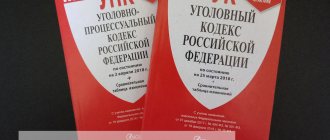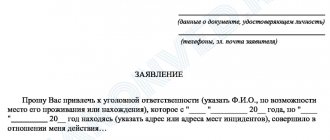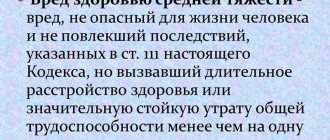ST 114 of the Criminal Code of the Russian Federation.
1. Intentional infliction of grievous harm to health, committed when exceeding the limits of necessary defense, is punishable by correctional labor for a term of up to one year, or restriction of freedom for a term of up to one year, or forced labor for a term of up to one year, or imprisonment for the same term. .
2. Intentional infliction of grievous or moderate harm to health, committed in excess of the measures necessary to detain the person who committed the crime, is punishable by correctional labor for a term of up to two years, or restriction of freedom for a term of up to two years, or forced labor for a term of up to two years. years, or imprisonment for the same period.
What is necessary defense?
This is a special condition that occurs in a person when his rights and freedoms are violated or a real threat of their violation is created. The main thing in this institution is the presence of a dangerous attack, which must appear together with physical impact, which as a result puts life in danger. A person, under the forces of fear and threats, is forced to commit an illegal act in order to protect his life and health or the condition of his loved ones. Article 37 of the Criminal Code of the Russian Federation excludes the criminality of an act when the person was in a state of necessary defense. Article 114 of the Criminal Code of the Russian Federation allows people who exceed the limits of this very defense to be held accountable.
What is taken into account in court
If self-defense resulted in the death of the attacker or injury to health, the court will consider the following circumstances:
- the relationship between the possible or inflicted harm of the offender and the response of the victim;
- nature of the danger: attack with a knife, attempted rape;
- physical characteristics of the victim and the offender;
- other circumstances: number of attackers, age, presence of weapons.
An important factor in the case will be the mental state of the victim at the time of the crime. The court takes into account the fact that a person responded in a state of passion. In fact, he could not adequately assess the situation.
In judicial practice there are cases when:
- the criminal stopped threats and other attacks, but was still killed;
- the person was provoked into attack;
- the victim had the weapon, not the perpetrator. In this case, it will not be defense, but an attack on an unarmed person;
- the criminal was killed after he was apprehended or neutralized.
Note!
Defense must be equivalent to attack. It is prohibited to use a pistol or knife against an unarmed criminal.
Rules of user conduct on the site
Article 114 of the Labor Code of the Russian Federation:
Employees are provided with annual leave while maintaining their place of work (position) and average earnings.
Article 116 of the Labor Code of the Russian Federation:
Annual additional paid leave is provided to employees engaged in work with harmful and (or) dangerous working conditions, employees with a special nature of work, employees with irregular working hours, employees working in the Far North and equivalent areas, as well as in other areas. cases provided for by this Code and other federal laws.
Employers, taking into account their production and financial capabilities, can independently establish additional leaves for employees, unless otherwise provided by this Code and other federal laws. The procedure and conditions for granting these leaves are determined by collective agreements or local regulations, which are adopted taking into account the opinion of the elected body of the primary trade union organization.
Article 117 of the Labor Code of the Russian Federation:
Annual additional paid leave is provided to employees whose working conditions at their workplaces, based on the results of a special assessment of working conditions, are classified as hazardous working conditions of the 2nd, 3rd or 4th degree or hazardous working conditions.
The minimum duration of annual additional paid leave for employees specified in part one of this article is 7 calendar days.
The duration of the annual additional paid leave of a particular employee is established by an employment contract on the basis of an industry (inter-industry) agreement and a collective agreement, taking into account the results of a special assessment of working conditions.
On the basis of an industry (inter-industry) agreement and collective agreements, as well as the written consent of the employee, formalized by concluding a separate agreement to the employment contract, part of the annual additional paid leave that exceeds the minimum duration of this leave established by part two of this article may be replaced by a separately established one. monetary compensation in the manner, in the amounts and on the terms established by the industry (inter-industry) agreement and collective agreements.
Article 118 of the Labor Code of the Russian Federation:
Certain categories of employees whose work is related to the specific characteristics of their work are granted additional annual paid leave.
The list of categories of employees for whom annual additional paid leave is established for the special nature of the work, as well as the minimum duration of this leave and the conditions for its provision are determined by the Government of the Russian Federation.
Article 119 of the Labor Code of the Russian Federation:
Employees with irregular working hours are provided with annual additional paid leave, the duration of which is determined by a collective agreement or internal labor regulations and which cannot be less than three calendar days.
The procedure and conditions for granting annual additional paid leave to employees with irregular working hours are established in federal government institutions by regulatory legal acts of the Government of the Russian Federation, in state institutions of a constituent entity of the Russian Federation by regulatory legal acts of state authorities of a constituent entity of the Russian Federation, in municipal institutions by regulatory legal acts of local government bodies .
Part 1 of Article 120 of the Labor Code of the Russian Federation:
The duration of the annual main and additional paid leaves of employees is calculated in calendar days and is not limited to a maximum limit. Non-working holidays falling during the period of annual main or annual additional paid leave are not included in the number of calendar days of leave.
Part 4 of Article 124 of the Labor Code of the Russian Federation:
It is prohibited to fail to provide annual paid leave for two years in a row, as well as to not provide annual paid leave to employees under the age of eighteen and employees engaged in work with harmful and (or) dangerous working conditions.
Paragraphs 1 – 3 of the “Rules for providing annual additional paid leave to employees with irregular working hours in federal government institutions” (approved by Decree of the Government of the Russian Federation of December 11, 2002 N 884):
1. Annual additional paid leave for employees with irregular working hours (hereinafter referred to as additional leave) is granted for work under irregular working hours to individual employees of federal government institutions, if these employees, if necessary, are occasionally involved by order of the employer to perform their labor functions outside normal duration of working hours.
2. The list of positions of employees with irregular working hours who have the right to additional leave is established by the internal labor regulations or other regulatory act of the institution.
The list of positions of workers with irregular working hours includes management, technical and business personnel and other persons whose work during the working day cannot be accurately recorded, persons who distribute working time at their own discretion, as well as persons whose working hours are due to the nature of the work. divided into parts of indefinite duration.
3. The duration of additional leave provided to employees with irregular working hours cannot be less than 3 calendar days.
The duration of additional leave for relevant positions is established by the internal labor regulations of the institution and depends on the volume of work, the degree of labor intensity, the employee’s ability to perform his job functions outside of normal working hours and other conditions.
Paragraphs 1, 3 – 5 of Part 5 and Part 6 of Article 302 of the Labor Code of the Russian Federation:
For workers traveling to perform work on a rotational basis to the regions of the Far North and equivalent areas from other regions:
- annual additional paid leave is provided in the manner and under the conditions provided for persons constantly working:
— in the regions of the Far North — 24 calendar days;
- in areas equated to the regions of the Far North - 16 calendar days.
The length of service that entitles workers who travel to perform work on a rotational basis to the regions of the Far North and equivalent areas from other areas to appropriate guarantees and compensation includes calendar days of shift in the Far North and equivalent areas and actual days of stay on the way, provided for by the shift work schedules. Guarantees and compensations for workers traveling to perform work on a rotational basis in the regions of the Far North and equivalent areas from the same or other regions of the Far North and equivalent areas are established in accordance with Chapter 50 of this Code.
Clause 7.1 of the Basic Provisions on the shift method of organizing work (Appendix No. 1 to the Resolution of the State Committee for Labor of the USSR, the Secretariat of the All-Union Central Council of Trade Unions, the Ministry of Health of the USSR dated December 31, 1987 N 794/33-82):
7.1. Annual leave for employees working on a rotational basis is granted in accordance with the established procedure after using rest days (time off).
The length of service that gives the right to annual basic and additional leave for work in hazardous working conditions, for continuous work experience at the enterprise, includes days of rest (time off).
If the end of an employee’s annual leave falls on the inter-shift rest days of the team in which he works, then the employee is given another job at the enterprise before the start of the shift..., or the employee is transferred to another shift shift. By agreement of the parties, the issue of granting this employee leave without pay can be resolved.
Article 321 of the Labor Code of the Russian Federation:
In addition to the annual basic paid leave and additional paid leave established by law, provided on a general basis, persons working in the regions of the Far North are provided with additional paid leave of 24 calendar days, and persons working in areas equated to the regions of the Far North are provided with 16 calendar days. days.
The total duration of annual paid leave for part-time workers is established on a general basis.
Article 322 of the Labor Code of the Russian Federation:
The annual additional paid leave established by Article 321 of this Code is provided to employees after six months of work with a given employer.
The total duration of annual paid leave is determined by summing up the annual main and all additional annual paid leave.
Full or partial combination of annual paid leave for persons working in the Far North and equivalent areas is allowed for no more than two years. In this case, the total duration of the leave provided should not exceed six months, including the time of unpaid leave necessary for travel to the place of use of the leave and back.
The unused part of the annual paid leave exceeding six months is added to the next annual paid leave for the next year.
At the request of one of the working parents (guardian, trustee), the employer is obliged to provide him with annual paid leave or part thereof (at least 14 calendar days) to accompany a child under the age of eighteen years old who is entering educational programs of secondary vocational education or higher education, located in another area. If there are two or more children, leave for this purpose is granted once for each child.
Article 14 of the Law of the Russian Federation of February 19, 1993 N 4520-1 “On state guarantees and compensation for persons working and living in the regions of the Far North and equivalent areas”:
In addition to the additional leaves established by law, provided on a general basis, persons working in the northern regions of Russia are also provided with additional annual leave of duration as compensation:
— in the regions of the Far North — 24 calendar days;
- in equivalent areas - 16 calendar days;
- in other regions of the North, where the regional coefficient and percentage increase in wages are established - 8 calendar days.
Part 12 of Article 5 of the Federal Law of June 5, 2012 N 50-FZ “On regulating the activities of Russian citizens and Russian legal entities in Antarctica”:
12. Persons who are part of the Russian Antarctic Expedition, including crew members of ships and aircraft, are provided with annual additional paid leave of forty-four calendar days.
Article 339 of the Labor Code of the Russian Federation:
The minimum duration of annual additional leave and the conditions for their provision to employees working in representative offices of the Russian Federation abroad in countries with special (including climatic) conditions, as well as the list of these countries, are established in the manner determined by the Government of the Russian Federation.
Clause 1, 3 and 5 of the Government of the Russian Federation of 04/21/2010 N 258 “On the minimum duration of annual additional paid leave and on the conditions for their provision to employees of representative offices of the Russian Federation abroad”:
1. Annual additional paid leave to employees of representative offices of the Russian Federation abroad (hereinafter referred to as employees) is provided if one of the following conditions is present in the host country:
a) harsh climatic conditions;
b) unfavorable environmental and (or) epidemiological situation;
c) military actions, armed conflicts;
d) unstable socio-political situation, including terrorist activities;
d) high crime rate.
3. The minimum duration of annual additional paid leave provided to employees working in the countries included in the list is 3 calendar days
5. The duration of the annual additional paid leave provided to employees working in specific countries provided for in the list is determined by the Ministry of Foreign Affairs of the Russian Federation in agreement with the Ministry of Labor and Social Protection of the Russian Federation, the Foreign Intelligence Service of the Russian Federation and the Ministry of Defense of the Russian Federation.
Part 2 of Article 348.10 of the Labor Code of the Russian Federation:
Athletes and coaches are provided with annual additional paid leave, the duration of which is determined by collective agreements, local regulations, employment contracts, but not less than four calendar days.
Part 3 of Article 350 of the Labor Code of the Russian Federation:
Certain categories of medical workers may be granted additional annual paid leave. The duration of additional leave is established by the Government of the Russian Federation.
Decree of the Government of the Russian Federation dated 06.06.2013 N 482 “On the duration of the annual additional paid leave for work with harmful and (or) dangerous working conditions provided to certain categories of workers” (approved the List of medical workers involved in the provision of psychiatric, anti-tuberculosis care, carrying out diagnostics and treatment of HIV-infected people, as well as persons whose work involves materials containing the human immunodeficiency virus, who are provided with annual additional paid leave for work under harmful and (or) dangerous working conditions)
Paragraphs 1 – 2 of the Decree of the Government of the Russian Federation of December 30, 1998 N 1588 “On the establishment of annual additional paid 3-day leave for general practitioners (family doctors) and nurses of general practitioners (family doctors) for continuous work in these positions”
1. General practitioners (family doctors) and nurses of general practitioners (family doctors) are granted an additional annual paid leave of 3 days for continuous work in these positions for more than 3 years.
2. When determining the duration of continuous work in the positions of general practitioners (family doctor) and nurses of general practitioners (family doctor) for the provision of an additional paid 3-day leave, count the time of immediately preceding continuous work in the positions of district doctors - therapists and district doctors - pediatricians of territorial areas and nurses of therapeutic and pediatric territorial areas.
Paragraph 1 of the Resolution of the Council of Ministers of the RSFSR dated January 17, 1991 N 27 “On measures to implement the proposals of the Committee of the Supreme Council of the RSFSR on health protection, social security and physical culture and the Central Committee of the trade union of healthcare workers of the RSFSR to improve the socio-economic situation in the healthcare system of the Russian Federation”:
1. Doctors and nursing staff of mobile medical teams in the regions of the Far North and equivalent areas, as well as paramedics working as of January 1, 1991 in medical positions in territorial therapeutic and pediatric areas in clinics (outpatient departments), paramedics of medical outpatient clinics and feldsher-midwife stations is established within the limits of funds allocated for salaries to health care institutions, an annual additional paid three-day leave for continuous work in these positions for more than three years.
Clause 15 of Article 2 of the Federal Law of January 10, 2002 N 2-FZ “On social guarantees for citizens exposed to radiation as a result of nuclear tests at the Semipalatinsk test site”:
Citizens who have received a total (accumulated) effective radiation dose exceeding 25 cSv (rem) are guaranteed social support measures:
15) use of regular annual paid leave at a time convenient for them, as well as receiving additional paid leave lasting 14 calendar days...
Law of the Russian Federation of May 15, 1991 N 1244-1 “On the social protection of citizens exposed to radiation as a result of the disaster at the Chernobyl nuclear power plant”:
Clause 5 of Part 1 of Article 14:
Citizens specified in paragraphs 1 and 2 of part one of Article 13 of this Law are guaranteed:
5) use of regular annual paid leave at a time convenient for them, as well as receiving additional paid leave lasting 14 calendar days...
Clause 2 and clause 6 of part 1 of Article 18:
Citizens specified in paragraph 7 of part one of Article 13 of this Law are guaranteed:
2) annual additional paid leave for those working in the zone, excluding additional leave provided for work with harmful working conditions, with the payment of a one-time compensation for health improvement in the amount established by paragraph 3 of this part, depending on the time of residence (work):
from April 26, 1986 - 14 calendar days;
from December 2, 1995 - 7 calendar days;
6) prenatal leave for women lasting 90 calendar days with health-improving activities outside the territory of radioactive contamination.
Part 1 and paragraph 4 of part 2 of Article 19:
Citizens specified in paragraph 8 of part one of Article 13 of this Law are provided with social support measures provided for in paragraphs 5, 7, 10 and 11 of part one of Article 18 of this Law.
In addition, they are guaranteed:
4) annual additional paid leave for those working in the zone lasting seven calendar days, excluding additional leave for work with hazardous working conditions, subject to permanent residence (work) until December 2, 1995...
Part 6 of Article 28 of the Federal Law of August 22, 1995 N 151-FZ “On emergency rescue services and the status of rescuers”:
6. Rescuers of professional emergency rescue services and emergency rescue units are provided with additional paid leave of no more than 15 days for their participation in emergency response efforts throughout the year at the rate of one day of leave per 24 hours of work.
Part 12 of Article 5 of the Federal Law of June 5, 2012 N 50-FZ “On regulating the activities of Russian citizens and Russian legal entities in Antarctica”:
12. Persons who are part of the Russian Antarctic Expedition, including crew members of ships and aircraft, are provided with annual additional paid leave of forty-four calendar days.
Order of the Ministry of Labor of Russia dated September 11, 2013 N 457n established the duration of reduced working hours and annual additional paid leave for work with harmful and (or) dangerous working conditions for veterinary and other employees directly involved in the provision of anti-tuberculosis care, as well as employees of production and storage organizations livestock products serving farm animals with tuberculosis.
Order of the USSR Ministry of Civil Aviation dated March 13, 1986 N 50 approved the rules for granting additional leave to civil aviation employees for work under special conditions.
Show more
Corpus delicti. Part 1
Let us conduct a general analysis of Article 114 of the Criminal Code of the Russian Federation, namely, first of all, Part 1.
- The object is safety, as well as human life and health, which are proclaimed to be the main value in the work of the state.
- The objective side is the infliction of life-threatening harm to health as a result of protection from an attack, but exceeding the limits permitted by law. In this situation, the discrepancy between the applicable protective measures and the nature and degree of danger of the attack should be clearly demonstrated.
- Subject is a person 16 years of age or older.
- The subjective side is intentional guilt. The peculiarity of such a crime lies in the suddenness and spontaneity of the intent that arises; a person should not plan it in advance.
Having analyzed the corpus delicti provided for in Part 1, we tried to form a complete picture of what kind of crime it is and what features it has. Necessary defense is a specific category in criminal law that requires detailed subjective research and analysis.
Exceeding necessary defense
When analyzing and qualifying the committed act, evaluative categories are important. That is, it is necessary to establish whether the person actually found himself in such a situation and whether the threat was proportionate to the damage that he inflicted on the attacker. Part 1 of Article 114 of the Criminal Code of the Russian Federation refers to excess of self-defense as intentional actions of the suspect that led to dangerous consequences close to, but not equivalent to, the death of the victim. There may be aggressive active behavior of the victim, but he did not create a threat to such an extent that he would suffer serious or moderate harm to health.





